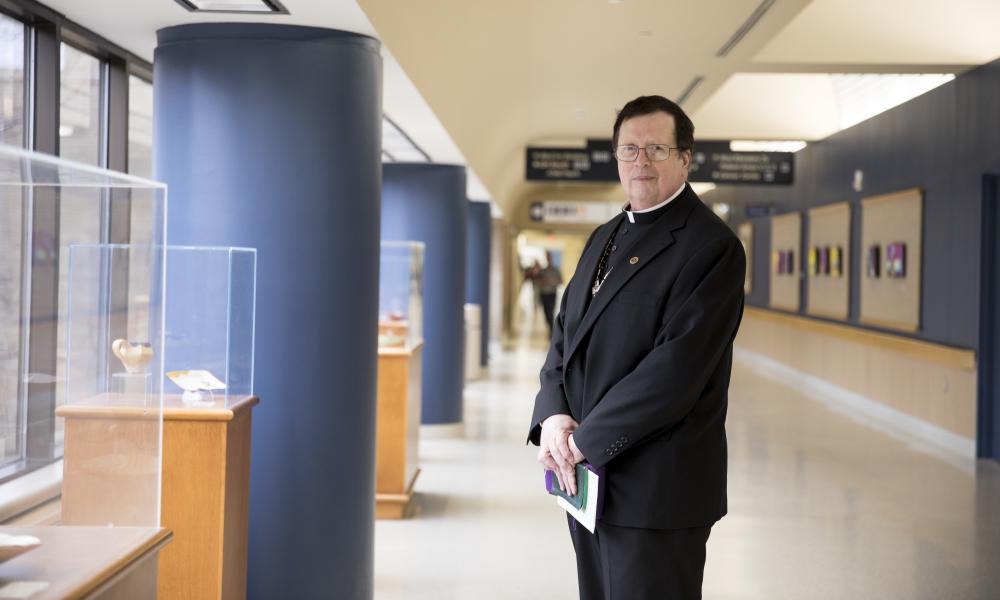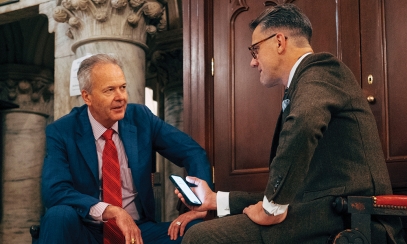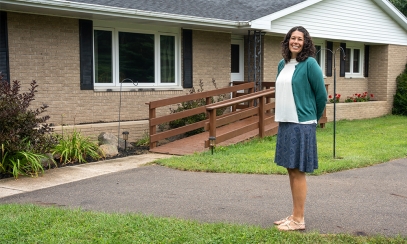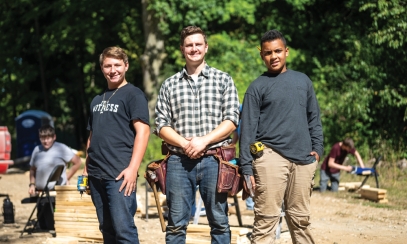
‘Anointing of the sick isn’t just for those who are dying’
Father Lew’s experience with a powerful sacrament
Father Lew’s experience with a powerful sacrament
Enter any door of the University of Michigan Medical Center complex, and you’re swept into the emotional and physical struggles coursing through its corridors. Rogel Cancer Center, Frankel Cardiovascular Center, C.S. Mott Children’s Hospital, the Emergency Department – people come to these world-renowned facilities seeking healing.
At the heart of the university hospital, the Department of Spiritual Care offers healing beyond the physical. From their offices next to the chapel, hospital chaplains and trained volunteers minister to patients and their loved ones through health crises and transition. Father Lewis Eberhart, a Diocese of Lansing priest, shares insights from his years as a chaplain for Michigan Medicine.
“There are over 1,000 beds here,” Father Lew explains. “Even with two priests, it’s not possible to serve everyone seeking spiritual support. Thank goodness for our volunteer eucharistic ministers. But for deeper spiritual ministry, we have a team of 12 chaplains and several students trained in the formal and informal prayers and rituals of various faith traditions. The hospital serves people of all faiths and those with no spiritual beliefs, so we are here for everyone.”
“We offer sacraments and engage in rituals with those who ask,” says Father Lew. “The sacraments are there to walk with the patients and families, offering the comfort of the Church and bringing Jesus to them. When I go on rounds, especially to one of the intensive care units, I make sure I let families know the sacrament of the anointing of the sick isn’t just for those who are dying,” he chuckles. “Some folks get pretty concerned if I offer it without that explanation because it’s sometimes called ‘extreme unction’ or ‘last rites.’
“Wherever patients are on this journey, when someone listens to them, that’s the biggest benefit for many. For example, I’ve had survivors of priest abuse unload on me. I listen as long as they need, then I offer to support them in speaking with their responsible bishop. If they never filed a charge, and if they waive their HIPAA rights, I would contact the local enforcement authorities to report the charge.
“More often, folks are just seeking Christ’s peace. I represent the Church, and I want to do that the best I can. I want to do any act I can that helps bring patients and their families peace. I can’t provide Communion to everyone who asks, but when I cannot share the Eucharist with someone, we usually try to help them uncover what issues lie behind their request.
“I sometimes have family members ask me to convince their loved one to keep fighting for life. I understand their desire. I served 22 years in the U.S. Navy, where death was what we fought and feared. When my father was dying, I insisted he pursue every medical option because I was determined we were taking one more fishing trip together. Looking back now on what he endured, I’m sorry I put him through that. But that personal experience, coupled with my professional knowledge, allows me to bridge the family’s wish for extraordinary measures and the doctor’s opinion that it won’t cure their loved one.
“It often helps when I can share the Michigan Bishops’ pastoral letter [Living and Dying According to the Voice of Faith]. It makes it clear that rejecting extraordinary measures doesn’t mean you’re taking steps to end your life. In fact, with the distinguishing difference that medicines are used for pain alleviation and not to end life early, the Church strongly favors palliative care for those facing death. With this approach, palliative care adds to the majesty of the process and the peace many seek as they come to the end of this life.
“This is heavy work! I sometimes come out of the hospital exhausted. But what an honor it is to be with patients and families in this stage of their journey!
“It’s strange how the Lord operates. Someone will see me in the hall and ask if I’m a priest. Then they will often ask if I can come up and give the sacraments to their loved one. Often-times the sacraments open pathways for discussion of the most serious questions. Why is this happening to me? How do I have hope? There aren’t always clear spiritual answers, but it is good to be in the valley with them.
“Anointing of the sick is for all Catholics. The complete ritual includes prayer, anointing with oil, confession, if the patient is able, the apostolic pardon and viaticum – Communion, literally food for the journey. If the patient is not able to eat, I offer the Eucharist to their family. It takes about 30 or 40 minutes to go through the complete ceremony. Usually while I give this sacrament, I watch the patient’s vital signs on the monitor. It’s amazing how often I see their breathing slow down and heart rate smooth out. You can actually watch the calm and peace come over them.”
“Many families hold hands around their patient and pray,” says Rev. Dr. Christina Wright, the department’s associate director. “I’ve seen patients who are not fully conscious begin to pray along when their family says the Our Father or prays the Rosary. Death is such a holy moment. Here at the hospital we give language and space to the sacred happening.”
Father Lew nods. “Being present with people and using the words the Church gives us: ‘Lord, fold your loving arms around ______ as he makes his journey. And will you, in turn, journey with his family. Walk that journey with them.’ It opens them to be led by the Spirit in prayer and allows the Holy Spirit to flow into the space. These rituals can actually help families move more easily through their grieving to the wake.”
“Death is a mysterious process.” Rev. Dr. Wright smiles. “I will often ask family members to tell me about their loved one as he or she is nearing the end of life. Sometimes along with the tears, genuine laughter and joy become part of the experience of saying goodbye.”
“Even when the heart stops beating, there may be electrical impulses in the brain. Patients may be able to hear even after they seem to have passed on.” Father Lew adds. “There are times when the family thinks their loved one is gone, then the patient takes another breath. Some who have near-death experiences report exactly what was said and done in the room after they were declared dead.
“All people have questions in the face of suffering. While they are here in this hospital, we try to find ways to help folks heal spiritual distress. Catholics have a unique gift in the sacraments which bring healing for our soul, if not always for our body. I have experienced their power, and I know the strength of the anointing of the sick because I see it working here.
“Whenever it comes, death is not the end of life. It’s the opening of a new door through which our journey continues. When we look at it that way, even death is a form of healing.”



